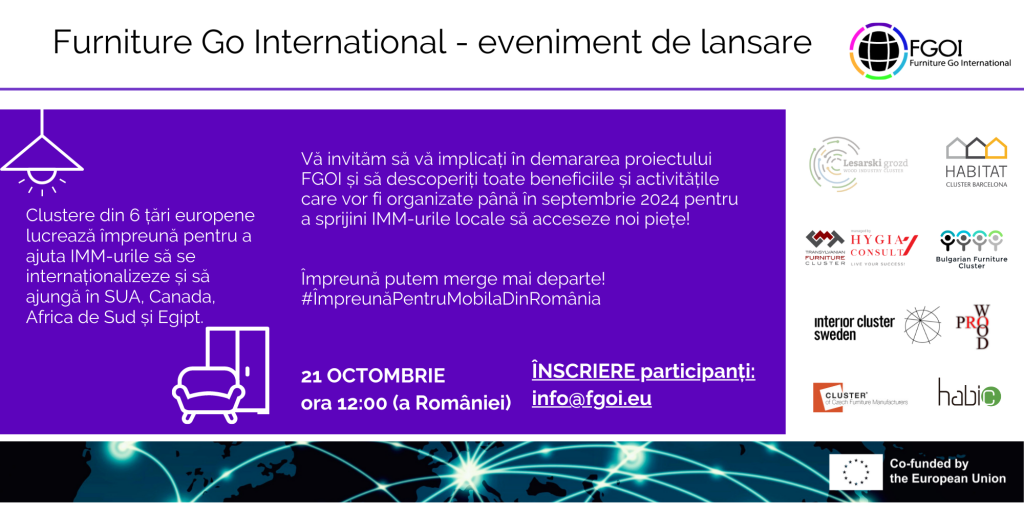Furniture Go International
Furniture Go International
Building alliances, opening markets

Furniture Go International (FGOI) will help SMEs reach new markets through collaboration and innovation. The project will lay the foundations for a strategic European partnership between clusters, to intensify cooperation in the furniture and related industries within the European Union and in four focus countries: the USA, Canada, Egypt, and South Africa.
The project has a duration of 36 months and a total budget of Euro 610,274.4, of which: Euro 549,248 is in the form of a grant and Euro 61,026 is private funding.
Furniture Go International (FGOI) is a well-founded project with ambitious objectives that started in mid-September 2021 and will last for 3 years. It is coordinated by eight clusters from six European countries. They will mutually share, for the first time, all their knowledge and market experience to carry out internationalization activities dedicated to SMEs in the sectors targeted by the project and 100% focused on results. The purpose of the project is to provide useful and customized tools for addressing markets outside the European Union, particularly the USA, Canada, Egypt, and South Africa.
HOW WILL THE FGOI PROJECT HELP IMPROVE THE SMEs COMPETITIVENESS?
- It will support European furniture manufacturers in entering new markets outside the European Union (USA, Canada, Egypt, and South Africa) through strengthened cooperation.
- It will assist European SMEs with resources, experience, skills, and knowledge, enabling them to access new markets and strengthen their current internationalization activities and partnerships, with the aim of achieving top positions on the global level.
- It will support European SMEs in their internationalization processes by strengthening interregional collaboration of clusters and by connecting with strategic partners.
- It will unlock valuable opportunities for 40 SMEs through the implementation of a series of customized actions aimed at facilitating their access to new markets, developing new international partnerships, and strengthening their position in international value chains.
- It will establish key contact points in 4 countries outside the European Union.
- It will facilitate long-term sustainability by creating synergies between FGOI partners, and together with other international business networks.
- The goal of developing viable business agreements between SMEs and new markets in the first 24 months of the project
The participating clusters, which together represent over 500 companies, the majority of which are SMEs, are:
- TFC-Transylvanian Furniture Cluster (Romania)
- HABIC-Association Cluster of Habitat, Wood, Office and Contract Sector (Spain)
- WIC-Wood Industry Cluster (Slovenia)
- KCN-Cluster of Czech Furniture Manufacturers (Czech Republic)
- ICS-Interior Cluster Sweden (Sweden)
- PWC-PRO WOOD Regional Cluster (Romania)
- BFC-Bulgarian Furniture Cluster (Bulgaria)
- HCB-Habitat Cluster Barcelona (Spain).
OBJECTIVES
- Supporting European SMEs to become dynamic and relevant players in global competition.
- Providing support for SMEs with internationalization capabilities, so that they can achieve top positions in the USA, Canada, South Africa, or Egypt markets.
- Promoting a pan-European strategic partnership between clusters and advancing international cooperation between clusters outside of Europe.
- Intensifying the cross-border and cross-sectoral network by stimulating collaboration.
The project includes, for example, the creation of long-term international alliances, the presence of permanent contact points in each of the markets of interest to ensure the generation of business opportunities, and the design of customized actions for the involved companies.
The European Commission funded the project after noting the severe economic effects of the COVID-19 pandemic on sectors that typically require products and services from the furniture and wood industry, such as tourism and retail. To better understand the impact of this field, 70% of the 130,000 companies in the furniture manufacturing sector in the European Union are small or medium-sized enterprises and employ more than one million people.

